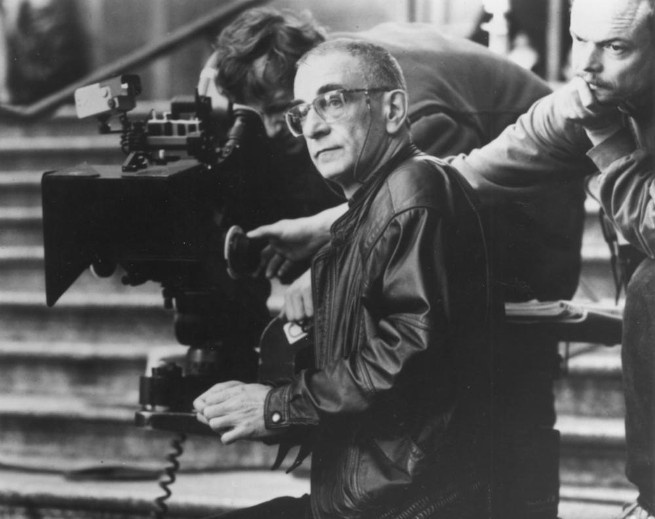From the City of Lodz (Z miasta Łodzi, 1969) 17mins
In his graduation film, shot under the supervision of well-known documentary filmmaker, teacher and theoretician, Kazimierz Karabasz, Kieślowski uses techniques learned from his professor. Kieślowski patiently observes and fondly records various places and events happening in Lodz, the city that he lived in for a long time. The film’s visuals and soundtrack create a warm portrayal of the city and its people.
Krzysztof Kieślowski: Documentaries & Short Subjects + Q&A
5 Dec 2014
Kieślowski’s documentaries tend to construct an implicit critique of official reality in a cumulative fashion. As film scholar Paul Coates puts it, 'Kieslowski’s most frequent solution was the serial alignment of voices expressing the same, or cognate feelings, individual instances massing into the statistically significant proportion that validates generalisation.' Many of his films are highly-edited montages collating people and ideas in provocative ways.
Full programme
-
From the City of Lodz (1969)
-
Refrain (1972)
Refrain (Refren, 1972) 11 mins
In this film, Kieślowski depicts the absurdity of life in the Polish People's Republic by focusing on bureaucracy of a funeral home. He presents the world where humility and compassion towards the dead are replaced by a plethora of questionnaires, payments and stamps. -
Bricklayer (1973)
Bricklayer (Murarz, 1973) 18 mins
Banned upon its release in 1973, the film is a portrayal of Józef Malesa, a party leader who, after October 1956, a key moment in Poland’s 20th century history, resigns from his position in the communist party and goes back to being a bricklayer. The film juxtaposes propaganda images with Malesa’s bitter confessions and acute observations that reveal not only his disappointment with the communist promise, but also the disparity between the official party line and citizens’ experiences. -
Hospital (1976)
Hospital (Szpital, 1976) 21 mins
The starting point for this short was the idea of brotherhood – Kieślowski considered making a film about miners, volleyball players or monks, but in the end decided to focus on surgeons. The film takes place in a malfunctioning and neglected emergency room of one of Warsaw’s hospitals, and serves as a poignant metaphor for the situation of Poland in the middle of the 1970s. -
From a Night Porter’s Point of View (1977)
From a Night Porter’s Point of View (Z punktu widzenia nocnego portiera, 1977) 17mins
The main protagonist in this film is a security guard who takes pleasure in controlling and harassing anyone who might be behaving against the norm: fishermen without permissions, people who left their work places too early, and kids who skipped school. Kieślowski shines a light on the time when searches, assaults and surveillance of opposition activists were a sad reality in Poland. -
Seven Women of Different Ages (1978)
Seven Women of Different Ages (Siedem kobiet w różnym wieku, 1978), 16 mins
A meditation on the relationship between an artist and art presented through the lives of seven dancers who are at different stages in their careers. At the beginning of the film, Kieślowski introduces a young girl at her first ballet class, while the film ends with an elderly lady, who teaches young ballet dancers their first steps. -
Talking Heads (1980)
Talking Heads (Gadające głowy, 1980), 16 mins
“Who are you?”, “What would you like?” – these are the questions that Kieślowski asks of a cross-section of Polish society. On the one hand, the expressed views on life radically change based on the age of the responders, but on the other hand, the desire for freedom and truth is unanimously articulated by all, despite their age.
Followed by a discussion with Mehelli Modi, Michael Brooke, Marc Isaacs and Witold Stok BSC
-
Mehelli Modi
Mehelli Modi is the founder of Second Run DVD, a company dedicated to releasing important classic and contemporary feature films and documentaries from around the world.
-
Michael Brooke
Michael Brooke regularly writes about Polish cinema for Sight & Sound and also contributed to the Blu-ray/DVD releases of Ashes and Diamonds (Arrow), Escape from the Liberty Cinema, Goodbye See You Tomorrow, Man of Marble, Mother Joan of the Angels and Night Train (Second Run).
-
Marc Isaacs
Marc Isaacs has made more than ten creative documentaries for the BBC and Channel 4 and his films have won Grierson, Royal Television Society and BAFTA awards.
-
Witold Stok BSC
Witold Stok BSC Director of Photography of 24 feature films, 25 TV features, and over 50 documentaries by directors including Krzysztof Kieślowski, Marek Piwowski, Nicolas Roeg, Stephen Poliakoff, and Paweł Pawlikowski. Director/scriptwriter of 13 shorts. Currently lecturing at Arts University Bournemouth, Goldsmiths University of London, and Andrzej Wajda's Master School of Film Directing in Warsaw.
Translation by Aga Baranowska
Aga Baranowska is part of the ICA student placement scheme, assisting the ICA Curatorial Team with research for forthcoming film and cinema programme. She is currently undertaking an MA in Film, Television and Screen Media at Birkbeck, University of London – one of the ICA’s university partners.
The ICA Cinema is now completely ad-free. Please note the feature will start following a selection of trailers and information relevant to the ICA programme. All films are 18+ unless otherwise stated.












